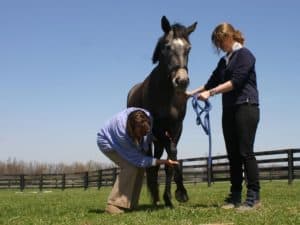Could Eye Temperature Help Detect Stress in Horses?
If your show jumper is stressed, can you see it in his eyes? Spanish researchers believe you can—if you’re equipped with an infrared thermographic camera, that is.
Horses’ eye temperatures can accurately reflect their immediate stress levels during show jumping events, said Ester Bartolomé Medina, PhD, of the Department of Agro-Forestry Sciences at the University of Seville, in Spain. Such testing could become a very useful tool in the future, she said.
“The main goal of our study was to select those animals that, despite of the environmental conditions they were submitted to during a competition (stress, type of competition, temperature, humidity, etc.), obtained the best sport results and (could) transmit this quality to their offspring,” Bartolomé said. “Stress was only one of the multiple factors that we know can affect sport performance in horses, and we were pleased to find that it could be accurately assessed with this new methodology.”
In her study, Bartolomé and colleagues measured the eye temperature of 173 Spanish Sport Horses at three intervals during two show jumping competitions: three hours before the competition, immediately after leaving the competition arena, and three hours after the competition. They compared these results with those of heart rate monitoring on the same horses at the same intervals
Create a free account with TheHorse.com to view this content.
TheHorse.com is home to thousands of free articles about horse health care. In order to access some of our exclusive free content, you must be signed into TheHorse.com.
Start your free account today!
Already have an account?
and continue reading.

Written by:
Christa Lesté-Lasserre, MA
Related Articles
Stay on top of the most recent Horse Health news with












